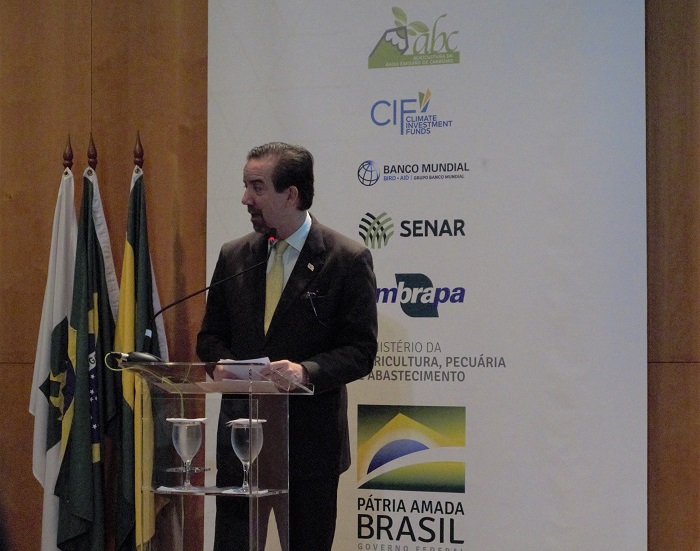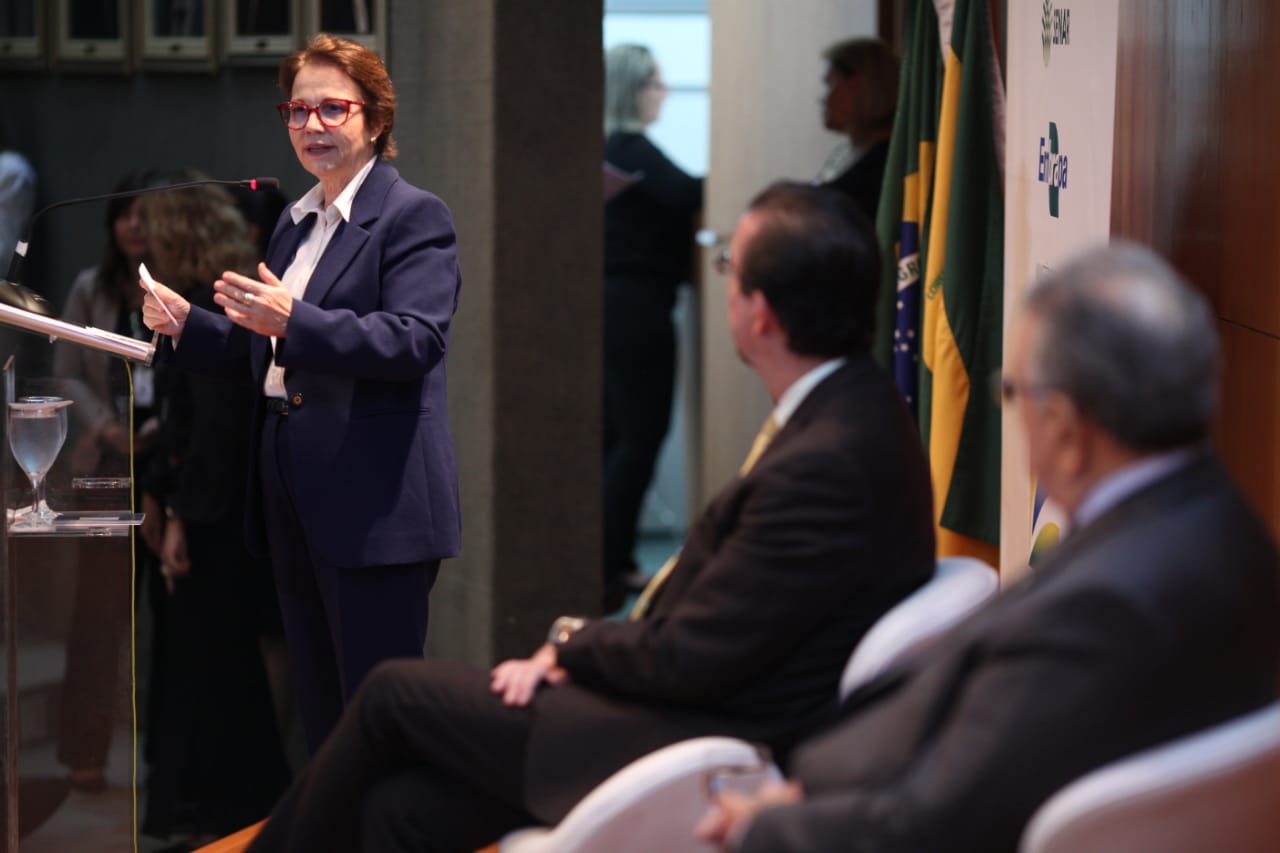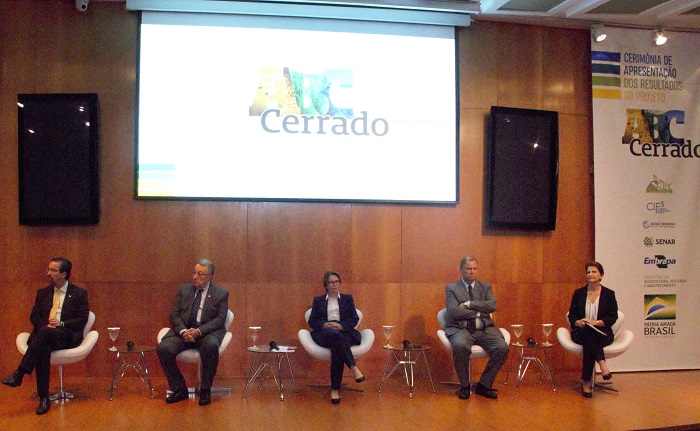ABC Cerrados project recovers 93,000 hectares of degraded areas
ABC Cerrados project recovers 93,000 hectares of degraded areas
An area equivalent to 110,000 soccer fields was rehabilitated and became productive with the adoption of a few technologies aimed at low carbon agriculture developed by Embrapa. This was one of the results of the ABC Cerrados Project on Wednesday (Nov 6), at the auditorium of Confederation of Agriculture of Brazil (CNA), in Brasília.
The combination of the technologies with farmers' capacity-building and technical and managerial assistance led to the success of the initiative. The minister of Agriculture Tereza Cristina, who was present in the event, emphasized: “This project is important and emblematic. It is an example to show to the world, which is concerned about our environment”. The implemented actions caused over 190,000 hectares to be incorporated to permanent preservation areas and legal reserves as defined in Brazilian law, which were part of what the project delivered.

The president of Embrapa, Celso Moretti, assured the audience that the Embrapa has several technologies that can significantly contribute to improving agriculture, animal husbandry and forestry: “What we have shown here today is how agricultural technology can support the development of Brazilian agribusiness”.
Moretti saying that the four technologies that comprised the project have demonstrated that it is possible to obtain higher sustainability in agricultural production in the country. “Brazil does not need to cut any more trees, it does not need to touch the Amazon or the Atlantic rainforest. With the recovery of degraded pastures alone, by 2030 Brazil is going to be the largest producer of foods, proteins and fibers”, he stated.
The figures from an unprecedented study that assessed the impacts of farmers' adopting the technologies overcame all expectations, evaluated the president of CNA, João Martins. In three years of implementaion, in addition to the recovered areas, consisting mostly of pastures, the initiative trained 7,800 farmers, more than 214,000 hours of technical assistance based on individualized diagnoses and benefited over 18,000 people including farmers and their families, consultants, students and other related audiences, 54% more than the initial goal.
The evidence of the need for better support to farmers is in the result that shows that farmers adopted the recommended technologies 11x more after they received training and technical assistance in comparison with farmers who had not been involved in the initiative.
Another figure that draws attention is the number of smallholders composing the project. Out of the 2,000 rural properties served, 86% are less than 500 hectares large. “This demonstrates that low carbon technology is also for smallholders”, affirmed the director of the National Rural Learning Service (Senar), Daniel Carrara.
Farmers are key to the process
In three years, the pasture was very impoverished; now, with Brachiaria, it is able to resist the drought periods, reported Rodrigo Barros, a farmer from Brejolândia (Bahia), who also changed the genetics of his herd. Now, with a small rotation irrigation system, good quality grass in the five hectares of the family ensured that their cattle raising grew fivefold. “The ABC Cerrado project came to open our eyes and I started to have a broader view of how to do any activity in our property”.
For each Real invested by the project, the farmers would invest seven. The implementation of the technology was completely under each farmer's responsibility. “This demonstrates that they believed in the project, that it would be possible to improve their production, their income, with solutions for their properties”, the president of CNA reports. Some farmers, who would produced the 45 to 50 liters per day, started to produce 300 liters, an excellent result obtained with the help of ABC Cerrado, João Martins affirms.
From 100 animals, Antonio Luiz Andrade, who has a property in Codó, Maranhão, started to raise 300 in the same area, after putting recommendations to improve his pastures into practice. “The technology is of great importance, especially for smallholders, who cannot afford the services of an agronomer, a technician. Smallholders, most of them, do not have technical knowledge”. Antonio planted Brachiaria and Guinea grass, as well as maize, to complement the bovines' diet during their fattening period, starting an Integrated Crop-Livestock System. Before that, he prepared the soil. “I never had made a soil analysis before. I made the analysis, I made the fertilization, as recommended, for the first time”, he recalls with enthusiasm.
With the implementation of one or more of the four technologies in the project - recovery of degraded pastures, Integrated Crop-Livestock-Forestry Systems (ICLFS), no-till farming system, and planted forests -, farmers in Bahia, Mato Grosso do Sul, Maranhão, Minas Gerais, Piauí, Tocantins and Distrito Federal gained in productivity and increased sustainability in their businesses.
Embrapa coordinated the technical segment of ABC Cerrados. “We have participated from the beginning, since the project conception. We reviewed all the technologies that were incorporated into the project and trained consultants, the consultants trained technicians, who in turn trained farmers - this was the sequence in the program's methodology”, explained Claudio Karia, head of Embrapa Cerrados.
For Karia, another gain from the project was showing that the problem is not in the generation of technologies but rather how to make this technology, this knowledge, reach farmers. “In this in case that, it was important to find interlocutors who had capillarity and were in condition to reach farmers, like Senar”, he explains.
Another one of the project's differential features was the offer of individualized technical assistance. “The most suitable technology was transferred to each property. nowadays we have to work with efficiency, with indicators, knowing that the farmer will invest one Real and reap ten in the future, with the technology that is suited to property's characteristics”, Daniel Carrara explains.  He reported that the adoption of a methodology to measure the project's results came from the partnership with Embrapa.
He reported that the adoption of a methodology to measure the project's results came from the partnership with Embrapa.
The minister of Agriculture also believes in ABC Cerrado. “This project will go on. The trained farmers willl keep using these technologies and their neighbors will also adopt them. Soon, with the agreements that we are making with several countries, we are going to have to increase our production. Here is the answer about how we are going to do that”, signaled Tereza Cristina.
Translation: Mariana Medeiros
Juliana Miura (4563/DF)
Embrapa Cerrados
Press inquiries
cerrados.imprensa@embrapa.br
Phone number: +55 61 3388-9945
Further information on the topic
Citizen Attention Service (SAC)
www.embrapa.br/contact-us/sac/

